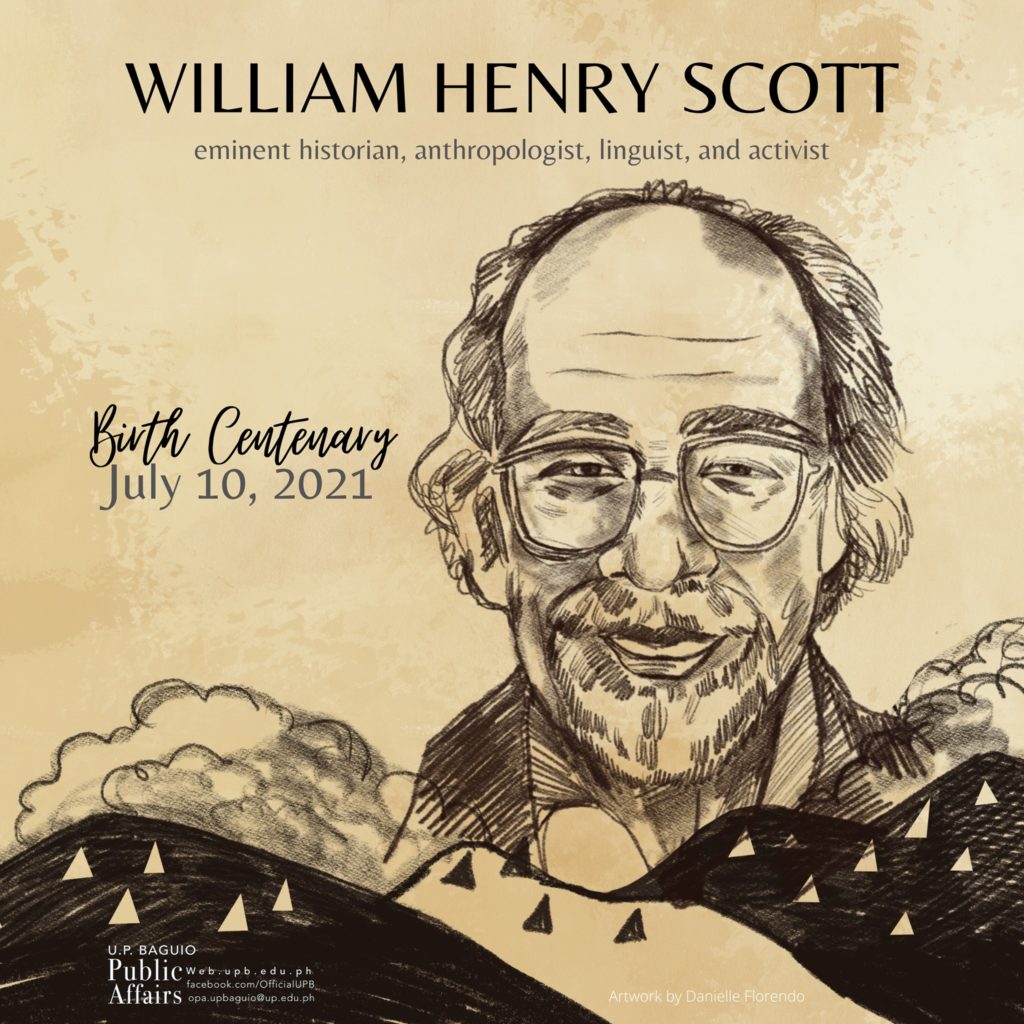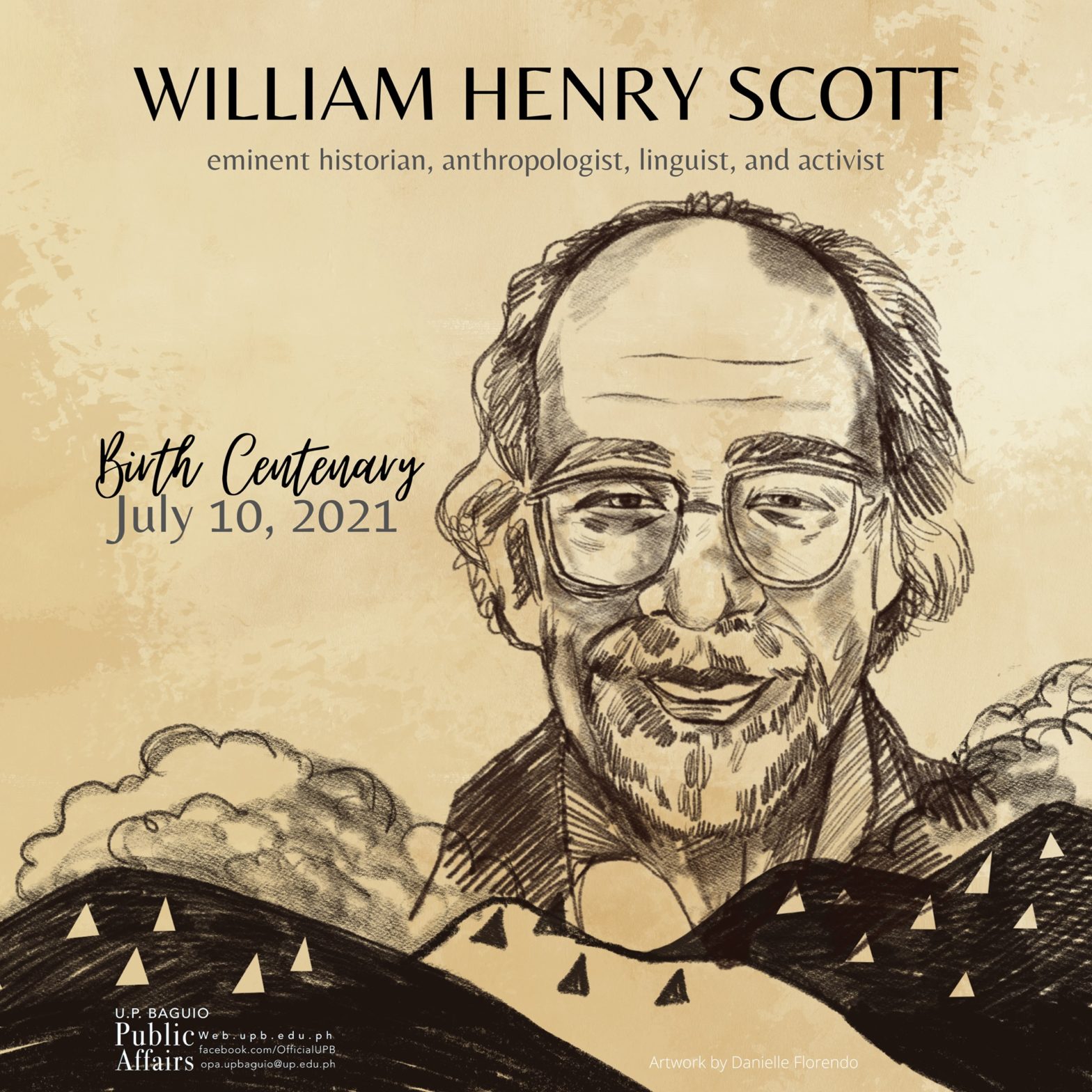Born on July 10, 1921, in Detroit, Michigan, USA, and baptized as Henry King Ahrens, he changed his name to William Henry Scott in 1939 after graduating from Cranbrook School in Michigan, on a three-year scholarship. W.H. Scott has been regarded as Cordillera’s most venerable scholar.
“Scotty,” as he “was fondly called by friends and admirers, was a missionary in the truest sense of the word, an accomplished scholar, a man with a keen social conscience” as June Prill-Brett and Jules De Raedt recalled him in their memorial essay, “We Remember Scotty,” published in the 𝙏𝙞 𝙎𝙞𝙢𝙞𝙡𝙡𝙖, October-November 1993. In the dedication of her book, 𝙏𝙧𝙖𝙙𝙞𝙩𝙞𝙤𝙣 𝙖𝙣𝙙 𝙏𝙧𝙖𝙣𝙨𝙛𝙤𝙧𝙢𝙖𝙩𝙞𝙤𝙣, Prill-Brett wrote that Scotty was an eminent historian, anthropologist, linguist, and activist.
His passing on October 4, 1993, stunned everyone who knew him. It was only seven months after his book, 𝑶𝒇 𝑰𝒈𝒐𝒓𝒐𝒕𝒔 𝒂𝒏𝒅 𝑰𝒏𝒅𝒆𝒑𝒆𝒏𝒅𝒆𝒏𝒄𝒆, was launched at the then UP College Baguio in March 1993. The 84-page book published by Erlyn Ruth Alcantara consists of two essays by W.H. Scott—”The Defense of Igorot Independence” and “The Origin of the Word Igorot”—and is accompanied by illustrations by Alex Aguilar. Alcantara recalls that during his trial as a political detainee at the onset of Martial Law in 1972, “[s]cholars put on the stand acknowledged his vast contribution to Philippine historiography and ethnography has given Filipinos the chance to gain a deeper understanding of our cultural heritage and destiny as a people.” She further conveys that “[t]estimonies from bishops, priests, and colleagues, and petitions from faculties, student bodies, and citizens’ assemblies were presented.” He was considered a Sagada kinsman, and upon his return from detention, the town greeted him with a hero’s welcome.
Writer LA Piluden, who taught at Saint Mary’s School of Sagada with which Scott had a long history of affiliation, expressed on the occasion of his birth centenary that “Scotty’s work and writings have taught us the facts and the myths from our precolonial history, of Igorots’ role in the struggle against colonial aggression, that ‘ethnic minority’ is just a construct, and, most importantly, that speaking out on behalf of others in the midst of oppression and injustice is an act of love.” These words from the young Cordillera scholar and UP Baguio instructor, resonate with how Scott’s friends and former students recall him.
Historian and retired UP Baguio professor, Dr. Rowena Boquiren, recalls the first time she met Scott in their boisterous class in a History classroom at the UP Diliman in 1974. With Scotty in her mind on his 100th birthday, Boquiren notes that with that history course as her background, “it was easy to appreciate why the all-sided analytical bent in history facilitated my understanding of diversity and dynamics in nationalism and of class and ethnicity.” She clearly recalls that “[t]wo courses under Scotty egged me on to learn more beyond national history in books when I decided to teach and reside in Baguio.” The halls in Diliman, to Session Road in Baguio City, and in Sagada, were “unappointed venues when he repeatedly cajoled me to do more archival work […]” said Boquiren.
Scott was “a disciplined intellectual, a diligent scholar, and a prolific writer” says Alcantara who also emphasized his exceptional wit as equally important as Scotty mien. “For those who knew him, admired him, loved him, and laughed heartily with him, his sense of humor provided a delightful balance to his brilliant mind, making him even more real and special as a person,” shared Alcantara who will be delivering a paper on the commemoration of the birth centenary of W.H. Scott, organized by the National Historical Commission of the Philippines and the UP Baguio Department of History and Philosophy as part of the 2021 Philippine quincentennial commemorations. (Words gratefully borrowed, in quotes or otherwise interspersed in the prose, and with information from the acknowledged references. Photo reference for the artwork, courtesy of Ms. Erlyn Ruth Alcantara.)

